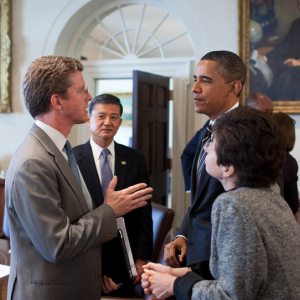Thanks to the scandals and missteps at the Veterans Administration and elsewhere in the federal bureaucracy, President Obama is losing all credibility as a manager and leader. Many Americans are justifiably enraged or at least awfully frustrated by federal government overreach, incompetence and corruption.
A good CEO must set goals and establish strategies to ensure successful delivery of services to customers. In this case, medical treatment to former military personnel relying on the VA.
Like other CEOs of large, geographically dispersed organizations with diverse product lines, the president must hire department heads to address issues foreseen and yet to be identified, and hold them accountable.
The president’s actions indicate politics trumped those responsibilities at the VA and other federal agencies.
When Obama assumed office, the VA’s problems were well known to veterans, the Congress and the concerned public. The Inspector General has published 19 wait-time audits since 2005, a commission co-chaired by Donna Shalala and Bob Dole documented delays and gaps in treatment in 2007, and published reports of management dysfunction and poor service go back to the 1950s.
Yet, Obama appointed Eric Shinseki to lead the VA because as an Army Chief of Staff in 2003, he publically disputed Donald Rumsfeld’s claims about the troop strength needed to invade Iraq. That made him the Army darling of congressional Democrats.
According to Duke University Peter Feaver, who advised the Bush administration on military matters, Shinseki’s record indicates he is hardly a “virtuoso manager.”
The VA put in place a system to reward managers for reducing wait times and getting veterans the services they need. At the VA Phoenix facility and elsewhere, the bureaucrats responded by simply not placing hundreds of patients on wait lists and reporting fraudulent data to get the extra cash. All the while, Shinseki, overwhelmed by executive responsibilities exceeding his abilities, was apparently oblivious to thousands of veterans being denied care and some consequently dying.
Now the president and Democrats want to escape accountability and regain the political upper hand by blaming Republicans in Congress for denying the VA adequate funds to do its job.
Since 2003, however, VA spending has increased 106 percent while its case load is up only 30 percent. A good deal of money has gone into feeding an inept, bloated and too often dishonest cadre of civil servants—some who should face criminal prosecution.
For ideologically committed liberals, the whole affair is a disaster. The VA scandal, along with public dissatisfaction with ObamaCare, lay bare that the federal bureaucracy is incapable of managing health care effectively.
And Democrats championing a national health service, patterned after the British model, are essentially proposing to generalize the frustrations suffered by 8 million veterans at the VA to more than 300 million Americans at virtually every medical facility across the nation.
Instead, most VA facilities should be sold to the private sector or closed.
The VA should simply reimburse private physicians and facilities for providing veterans with treatment. Only reserved to VA should be severe, highly-specialized conditions—mostly those related to combat—that require unique expertise not generally available to civilians.
Sadly, as with the IRS targeting harassing conservative groups, the State Department missteps in the Benghazi tragedy and other scandals, the president is not forthrightly acknowledging and addressing failures of performance at the VA.
By hewing to an ideological bias against the private sector and seeking to shift blame on Republicans, Obama is denying veterans relief they need now, and is destroying confidence among Americans that their government can do much of anything well or honestly.
From this professor, the president gets an F in management and leadership.

